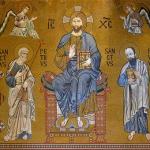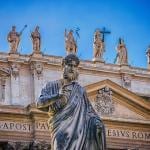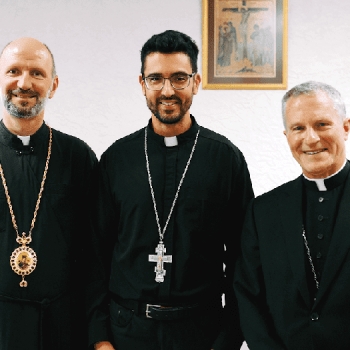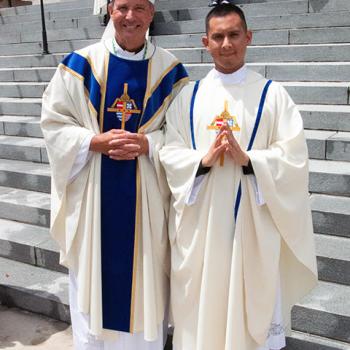To those who study Church history the Arians are a familiar foe of orthodoxy. The heresy came to the forefront in the 4th century, and was declared heretical at the Council of Nicea in 325 and again at the Council of Constantinople in 381. How was the proper view of Christ upheld? Was it strictly by St. Athanasius’s brilliant exposition of scripture? No doubt that was part of the equation, but Arius was also pleading his case from sacred scripture. Apostolic succession and the traditions that spring from it were also at play.
Apostolic Succession An Unsung Hero
By all accounts Arius was also a brilliant orator, and was able to get crowds riled up into a frenzy. He was a charismatic individual who was also able to coat his words with enough of a shadow of orthodoxy to get some bishops to agree with his opinion. So who was Arius, and what was he propagating? Though that question will be answered, the most interesting question is how the heresy was thwarted?
St. Athanasius gets a lot of credit, and deservedly so, for championing orthodoxy against the false view of Christ that Arius was teaching. As previously stated he did so using scripture, but the canon would not have been declared until the Council of Rome is 382. The unsung hero during the whole Arian controversy of the 4th century is apostolic succession, and the teaching authority that springs from it.

WHAT IS ARIANISM?
Arianism is a heresy that became popular in the early Church in the fourth century. It is tempting to say that Arianism was a denial of the full divinity of Christ.
To get the full story of the Arian controversy it is necessary to dig a little deeper. This deeper exploration will assist in understanding, not only the nature of the heresy, but the role that apostolic succession played in getting it condemned.
The beginning of the controversy can be traced to the earliest patristic fathers such as St. Justin, St. Clement of Alexandria, and Origen. This is not suggesting that they were denying the divinity of Christ, but has to do with the idea of the Logos. The Greek philosophers saw God as immutable, and the philosophers were told that Christians believed in such a God.
In regard to the Logos Richard Norris writes, “Logos was the divine reason uttered as the divine Word for the sake of forming and governing the world (Norris, 6). At least that is the understanding that the Stoics and Platonists had as this is not orthodox teaching. This was dangerous as some Christians began to say that the Father was impersonal while the Son, or Logos, was capable of human relationships.
It was hard for a pagan people to understand the Trinitarian concept. Specifically, that the Father, Son, and Hold Spirit have always existed in unity.
It was easier to accept that the Son was somehow subordinate, and this is where a priest named Arius enters the doors of Church history. To these pagan converts Arius made Christ out to be a type of divine hero, and that was easier for them to grasp.
Early Years Of Arius’s Error
Arius was a student of Lucian of Alexandria, and while studying under Lucian he became friends with a man by the name of Eusebius of Nicomedia. This Eusebius must not be confused with the great church historian of the same name. Eusebius plays an important role in the promulgation of the Arian heresy.
Arius was a priest who was ordained in Alexandria is 311. He was a charismatic individual who came to openly challenge the doctrine of the Trinity that his Bishop, Alexander of Alexandria, was teaching.
Many of the locals relayed behind Arius because of his persuasiveness as a public speaker, and used verses such as Proverbs 8:22 to support his doctrine. Proverbs 8:22 states, “The Lord created me at the beginning of his work, the first of his acts of old” (RSV). This basis for Arius’s argumentation continues through Proverbs 8:31, and it describes the role of wisdom in creation.
St. Athanasius And Apostolic Succession On The Case
Since Christ is the Logos he is God’s personified wisdom, or reason, on earth. Since this passage of scripture says that he was created then he must not be the same substance of God. If he is not the same substance of God then he must not be fully divine. In this regard Arius writes, “Before he was begotten or created or ordained or established, he did not exist (Schaff)”.
In Arius’s view Christ was a created being and he had the tendencies that created beings have. This meant that he was even liable to change or even to sin. Saint Athanasius sums up the views of Arius quite nicely. In his first discourse against the Arians he writes:
For what can they say from it, but that ‘God was not always a Father, but became so afterwards; the Son was not always, for He was not before His generation; He is not from the Father, but He, as others, has come into subsistence out of nothing; He is not proper to the Father’s essence, for He is a creature and work?’ And ‘Christ is not very God, but He, as others, was made God by participation; the Son has not exact knowledge of the Father, nor does the Word see the Father perfectly; and neither exactly understands nor knows the Father. He is not the very and only Word of the Father, but is in name only called Word and Wisdom, and is called by grace Son and Power. He is not unalterable, as the Father is, but alterable in nature, as the creatures, and He comes short of apprehending the perfect knowledge of the Father (Schaff, 310).
Future Posts
This article is only part one of Three. Stay tuned.
Works Cited
Norris, Richard. The Christological Controversy. Fortress Press. Philadelphia, PA: 1980. Print
Schaff, Philip, and Henry Wace, eds. St. Athanasius: Select Works and Letters. Vol. 4. New York: Christian Literature Company, 1892. Print. A Select Library of the Nicene and Post-Nicene Fathers of the Christian Church, Second Series.













